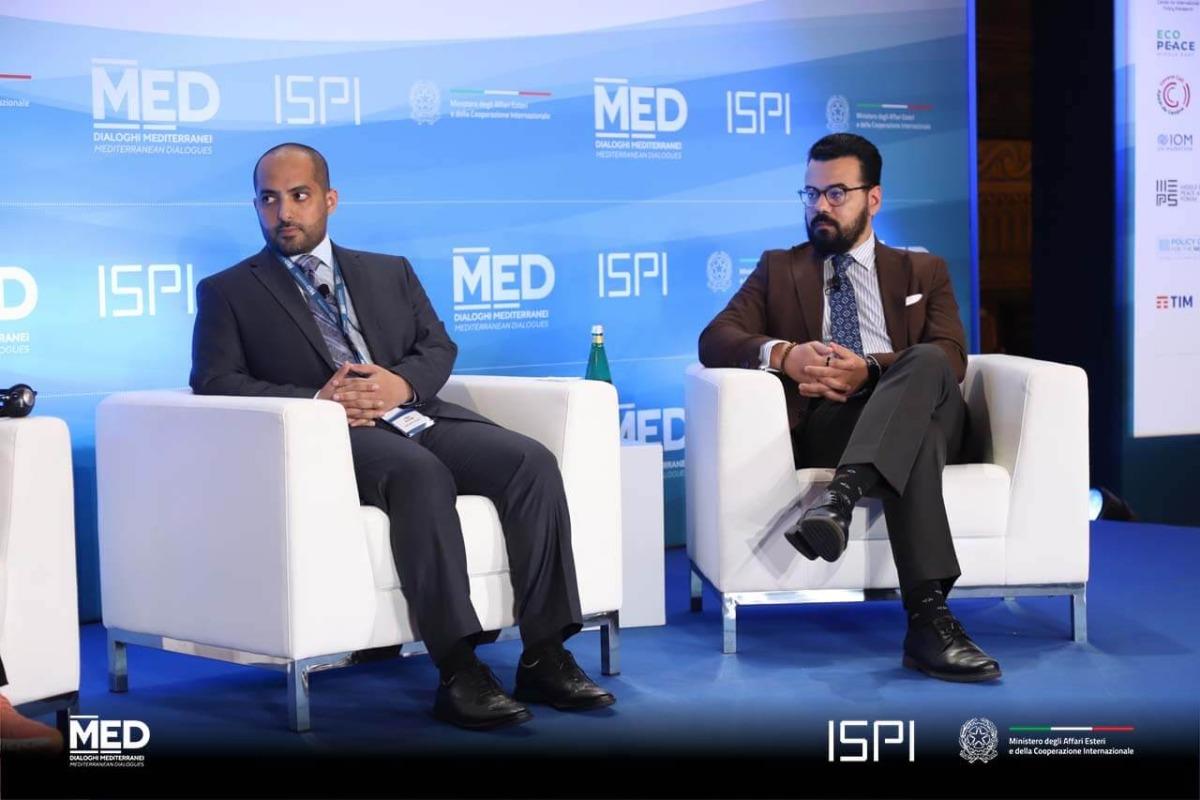
AI And Middle East: Insights From MED Dialogues 2025
Doha: The 11th edition of the Mediterranean Dialogues (MED) Conference 2025, held from October 15 to 17 in Naples, brought together global policymakers, experts, and industry leaders to discuss issues shaping the Mediterranean region, from security and economy to energy and emerging technologies.
Since its launch in 2015, the MED Conference has established itself as a premier platform fostering dialogue and cooperation among political leaders, academics, and civil society across the Mediterranean.
One of the notable sessions of this year's gathering focused on Artificial Intelligence (AI) and the Middle East's growing role in a global technological landscape increasingly defined by competition between the United States and China.
Moderated by Merissa Khurma, Director of the Middle East Program at the Wilson Center, the panel featured the Director of Strategic Technologies and Cyber Security Program at the Middle East Institute Mohamed Suleiman, and Director of the Consultation Department in Saudi Arabia Faisal Al-Otaibi.
Suleiman described the global AI race as a competition over compute capacity-the combination of semiconductors, data centers, and energy infrastructure needed to power artificial intelligence systems.
“It's not just about chips,” Suleiman explained.“Compute means the entire ecosystem-data centers, energy supply, and capital investment.”
He noted that global compute capacity currently stands at around 65 gigawatts, but demand could surge to 200–300 gigawatts in the coming years as autonomous vehicles and robotics expand.
According to Suleiman, Gulf states such as Saudi Arabia and the UAE are strategically positioned to become major players due to their abundant energy resources and capital investment capabilities.“This region can become the third major theater for AI-an energy and capital hub that complements the U.S. and China,” he said.
He pointed to Saudi Arabia's Humane initiative, which targets gigawatts of compute capacity by 2030, and the UAE's Stargate Project, aiming for 5 gigawatts, as examples of large-scale regional ambitions.
Faisal Al-Osabi outlined Saudi Arabia's comprehensive AI strategy, developed under Vision 2030 and led by the Saudi Data and AI Authority (SDAIA), chaired by Crown Prince Mohammed bin Salman. He said the Kingdom's AI roadmap is built on four pillars - data, talent, innovation, and governance which include the creation of a National Data Bank and national cloud platform (DIM) which has centralized government data, saving an estimated 5.3 billion riyals.
He also outlined the partnerships with leading universities such as Oxford and Stanford, along with companies like NVIDIA, IBM, and Microsoft, have boosted AI training and workforce development.
Read Also-
Reem Al Hashimy stresses collective regional efforts for lasting Gaza peace
Europe and the Mediterranean: A shared destiny in fragmented world
Palestinian Minister calls for sustained truce, global support to rebuild Gaza
According to him, Saudi Arabia has also launched its own Arabic Large Language Model, Alam, which trained on more than 400 billion Arabic tokens, and now ranked the top Arabic model globally. It also developed speech recognition technology capable of understanding the Kingdom's diverse regional dialects.
There is also the Personal Data Protection Law (PDPL)-Saudi Arabia's equivalent of the EU's GDPR-was enacted, alongside 370 data management offices across government entities to ensure compliance.
Al-Otaibi added that Saudi Arabia now ranks third globally in AI job growth, citing data from Stanford University, and that nearly 70 percent of Vision 2030's strategic goals are linked to data and AI.
He also highlighted the creation of AI Centers of Excellence across key sectors, including energy, healthcare, and smart cities. In Riyadh, AI-driven traffic systems have reportedly reduced congestion by 36 percent, he noted.
Returning to the broader geopolitical implications, Suleiman emphasized that nearly 75 percent of the world's compute infrastructure is concentrated between the U.S. and China, leaving space for the Gulf and Mediterranean regions to play a bridging role.
“The Mediterranean should be viewed as a unified compute corridor,” he said.“It can serve as the link connecting the U.S., the EU, and the Gulf in AI infrastructure.”
He cited several frameworks that could strengthen these links, including the US-EU Transatlantic Data Agreement, the US-UAE technology partnership, and EU-GCC summits in Brussels.
Suleiman noted that the UAE is building a supercomputer cluster in Italy, and Gulf companies are collaborating with European firms on industrial AI projects-signs that the region is becoming“a coherent and shared strategic hub for global compute.”
He predicted that regional AI leaders such as Saudi Arabia's Humane and the UAE's G42 will increasingly complement U.S. technology giants like Google, Microsoft, and Oracle in providing infrastructure and services to emerging markets.
The discussion concluded with questions from the audience on the integration of AI in defense technologies and autonomous systems. Panelists agreed that rapid technological progress must be matched with strong governance and ethical safeguards.
The session underscored how the Middle East and Mediterranean are fast emerging as critical hubs in the global AI ecosystem, leveraging their energy wealth, investment capacity, and strategic geography to shape the next chapter of artificial intelligence development.

Legal Disclaimer:
MENAFN provides the
information “as is” without warranty of any kind. We do not accept
any responsibility or liability for the accuracy, content, images,
videos, licenses, completeness, legality, or reliability of the information
contained in this article. If you have any complaints or copyright
issues related to this article, kindly contact the provider above.
Most popular stories
Market Reseach
- B2PRIME Strengthens Institutional Team's Growth With Appointment Of Lee Shmuel Goldfarb, Formerly Of Edgewater Markets
- BTCC Exchange Scores Big In TOKEN2049 With Interactive Basketball Booth And Viral Mascot Nakamon
- Ares Joins The Borderless.Xyz Network, Expanding Stablecoin Coverage Across South And Central America
- Primexbt Launches Stock Trading On Metatrader 5
- Solana's First Meta DEX Aggregator Titan Soft-Launches Platform
- Moonacy Protocol Will Sponsor And Participate In Blockchain Life 2025 In Dubai
- Primexbt Launches Instant Crypto-To-USD Exchange




















Comments
No comment